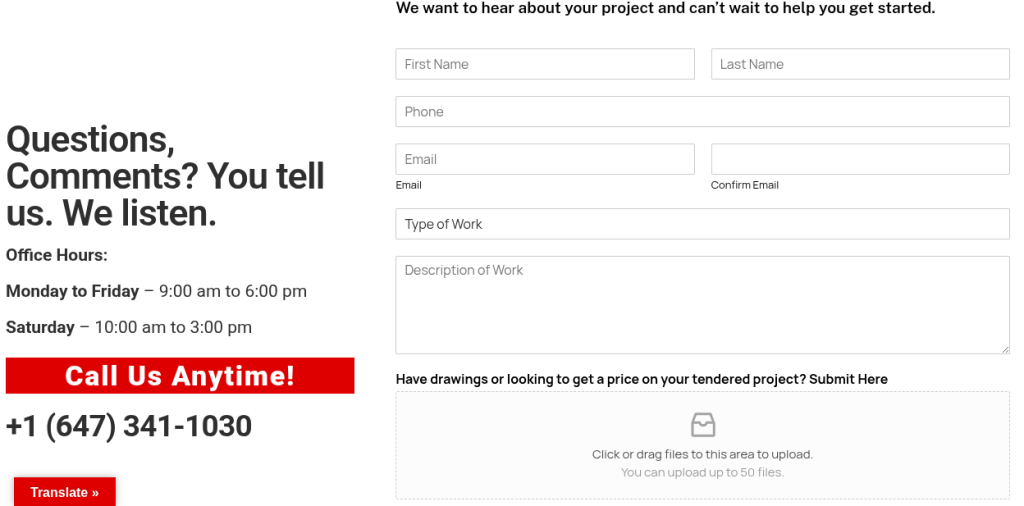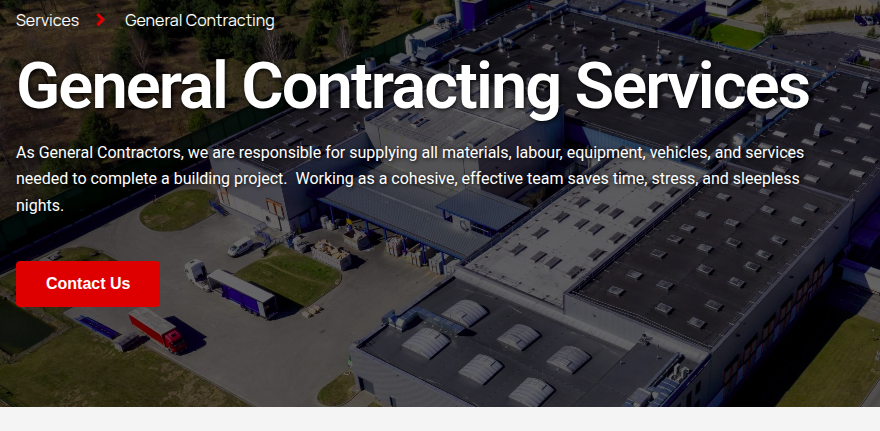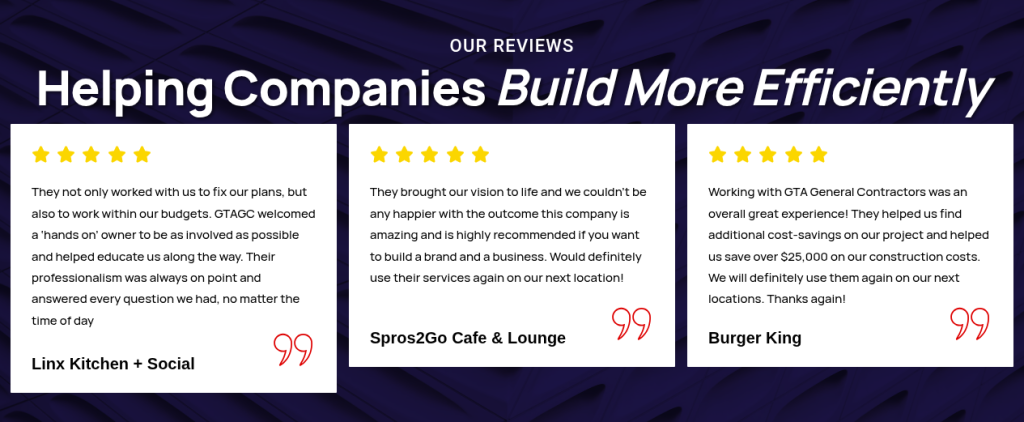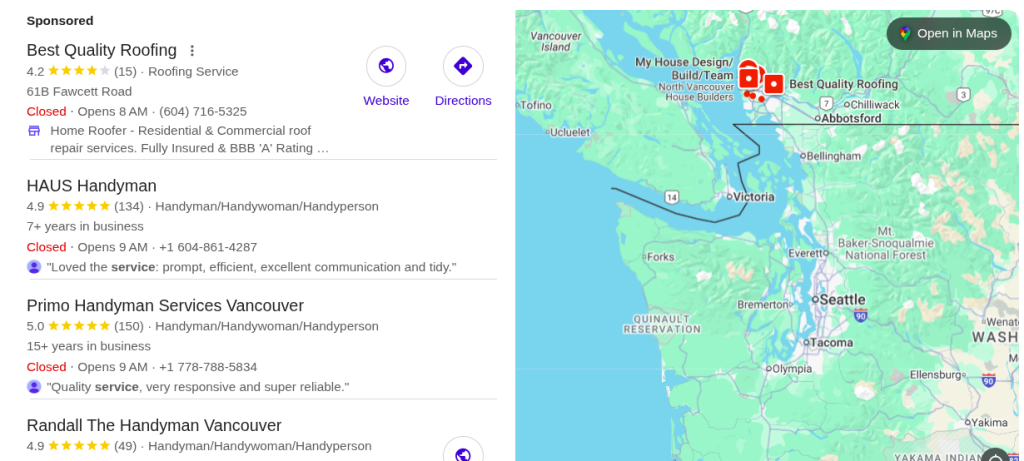Contractor Marketing for Business Growth
Explore several contractor marketing strategies that your business can employ to grow.
Understanding Contractor Digital Marketing
Any business is either growing or stagnating, there’s hardly any in between. Unfortunately, in the current economy, running a contractor business is hard, let alone trying to grow it.
Your business needs a strong online presence and digital marketing strategies that will help you reach out to your potential clients and persuade them to hire you.
dNOVO Group marketing experts have come together to create this guide on contractor marketing. Based on our decades-long experience, the guide provides you with the best strategies to successfully compete with other companies for potential customers and win.
What is Contractor Marketing
Contractor marketing is the business activity aimed at client acquisition, retention, and upselling. Most of your marketing efforts will be focused on acquisition since it’s the most resource-intensive part of marketing.

However, you should also remember to invest time and money into retaining past clients and selling more contractor services to the present ones.
The digital marketing campaign for a contractor business includes:
- Website optimization
- SEO
- Content marketing
- PPC ads
- Email marketing
- SMM
- Video marketing
Why Your Contractor Business Needs a Digital Marketing Strategy
Home renovations, roof repair, and similar services were on the rise during the pandemic. Many people had returned home and were investing in improving their dwellings. The situation changed with the end of the lockdown.
The Canadian economy has been in recession, and until the end of July 2024, the interest rates had been growing. The construction industry heavily depends on interest rates and has been negatively impacted by this growth.
Finding new clients and competing for them is getting harder and harder. That’s the main reason your contractor business needs a complex contractor marketing strategy.
There are multiple other benefits of an online marketing strategy for your business:

Marketing for Contractors
This guide is the third in the series of marketing and SEO guides for contractors. Check out other guides in the series:
- Roofing SEO
- Roofing Marketing
- Contractor SEO
- Construction Marketing
- Construction SEO
- Landscaping Marketing
- Landscaping SEO
- Home Remodeling Marketing
- HVAC Marketing
- Plumbing Marketing
- Windows & Doors Marketing
Contractor Website as a Basis of Digital Marketing Strategy
The website should be the first step in implementing a marketing strategy for your contracting business. It helps you get your business online and attract potential clients. It will also help them get all the necessary information about your company.
The Essential Parts of the Contractor Website
Let’s begin with the essential elements of the website:
- Book Appointment
- Services
- Gallery
- Rankings
- Service Area
Book Appointment Feature
A good contractor website should give customers multiple ways to get in contact with the company.

This contractor’s contact page gives the user two options: to call or to send a message through a form. Ideally, you’d want to add the option to talk to you through a live chat or through a social media messenger as well.
Apart from conversions, this functionality also enables you to collect emails for your email marketing campaigns. It will come in handy for both retention and upselling.
Let’s say the potential client booked an appointment but never showed up, or the appointment wasn’t fruitful. You can later send an email to this client and try to get them interested in similar or different services.
Service Pages
Service pages support contractor SEO strategy and inform potential customers about your services. They help people find your business and explain what services they can get from you. Check out the screenshot below. The contractor business lists all types of work they provide:

Optimize service pages for organic search, and local residents can find them when looking for a contractor. You can also optimize the pages for conversion by adding a call-to-action button to them, like in the example below.

Gallery
Showcase the projects you did in the gallery. It will help you gain the trust of website visitors and convert more leads. Hire a good photographer to do scenic shots of your work to impress potential clients.

If you have the permission of the client, share more details about your best projects, like the price and the timeframe that it took to finish.
Service Areas
If you run a small or medium contracting business, you probably won’t be eager to move too far from home. It’s best to inform your potential clients about your limitations in advance.
Create service area pages that focus on the major locations you serve. This will bring you more local clients from organic search.
Reviews
Displaying customer reviews on a contractor’s website helps you build trust with potential customers. It doesn’t always require a separate page. You can put them on a service page or the home page.

If you can, it’s best to showcase reviews from third-party sources like Google or a review website. This way, customers will know for sure that the reviews are legitimate.
SEO for Contractor Business
Search Engine Optimization is a series of marketing efforts aimed at improving website positions in search results. The higher your position for any given keyword, the more website traffic your contractor site receives, and the more qualified leads you get.
The key elements of Contractor SEO are:
- Keyword Research
- Link Building
- On-page SEO
- Technical SEO
- Local SEO
Keyword Research
The backbone of your search engine optimization, keyword research, is the process of collecting the keywords for your website and content marketing campaign.
Some keywords you’ll add naturally as you create your site. For instance, keywords like “contractor services,” names of the services you provide, and the locations you serve. Finding more keywords than that basic set helps your website rank for more user search queries and get more traffic.
Use a keyword research tool to find more keywords and choose the ones that make sense to be included on your site. Keywords have three main characteristics you need to take into account when you pick them.
1. Volume
Keyword volume is an estimate of the number of times people look for a particular word or phrase in search engines per month in a certain location. Here’s what the SEMrush SEO tool can show during a keyword research.

It has 4,400 searches per month in Canada. Obviously, you would want to rank for this keyword, the problem with this word is the next metric.
2. Difficulty
Keyword difficulty is an estimate of how hard it will be for a website to get to the top of search results. Home renovation from the screenshot above has an 80% difficulty. As explained in SEMrush, you’ll need a high-quality content piece and 178 high-authority domains referring to your page.
That may be hard for a small or medium-sized contractor business. That’s why you can try searching for a synonymical keyword with smaller difficulty. For example, house renovation has 880 searches per month and 65% difficulty.

3. Intent
Keywords differ in the search intent behind them. For example, those who look for home repair services have commercial intent. It means they are researching the different service providers. Many SEO tools will highlight the type of intent a keyword has.

“Where to stay during home renovation” is an informational keyword. It means that people are searching for general information about a certain thing.

The third type of intent is transactional. It means that a person is ready to complete an action (book an appointment, make a purchase, etc.).
We suggest going after all types of keywords, transactional, commercial, and informational, as they all play important roles in lead generation.
The main task of keyword research is to find keywords with high volume, low difficulty, and commercial intent. Like “handyman services,” for example:

Focusing on relevant keywords with high traffic potential and low keyword difficulty lets your contractor website score some easy wins and increase traffic by a large percentage. Later offers in keyword research will bring in marginal improvements.
Link Building
As mentioned above, pages built around keywords with high difficulty require many backlinks to get to the top of the search results. That’s why link building is a critical part of SEO strategy. However, your positions will be impacted not only by the referring links but also by those on your website.
Links from other websites help Google and other search engines understand that your website is trustworthy. Internal links help transfer the impact of backlinks across the website to the most important pages.
To find link opportunities, analyze your competition’s backlinks with an SEO tool and hand-pick the websites that are relevant to your business. In contractor marketing, you’ll most likely be working with these types of links:
- Business directories. You can submit your website to multiple local business directories and review sites to receive a backlink.
- Guest posting. Create quality content for industry blogs to get a link.
- Links earned by content. Create a valuable piece of content like a construction inspection checklist, publish it on your site, and show it to other website owners to earn a link from them.
On-Page SEO
Including keywords in your content isn’t enough. You need to strategically place them on the page. It will help search engine crawlers understand what your page is about and how to display it in search results.

Your focus keyword should be included in the meta title, meta description, first-level header, second-level header, URL, picture alt texts, and introduction. Add supporting keywords throughout the page in an organic way.
Technical SEO
Apart from keywords, links, and on-page SEO, Google crawlers check the UX of the page and website as a whole. A website that is not mobile-friendly, has chaotic navigation, and a low page loading speed will have trouble ranking higher than pages that perform better.
There are multiple paid and free tools that can help you do the diagnostics of your website and understand the errors that are impeding your digital marketing. In the screenshot below, you can see the result of website speed on mobile devices with a free tool.

As you can see, the website isn’t mobile-friendly and needs some serious improvement in its page download speed.
Typically, website audit tools provide suggestions on what can be done to fix the issues that plague your website.
Local SEO
As an SMB contracting business, you probably operate within a limited area of service. That’s why you want to attract local customers rather than people living outside your area of service.
Local SEO helps you attain this goal. To this end, you can create service area pages optimized for local keywords like this one.

Another important way of doing local contractor marketing is creating and optimizing a Google Business Profile. Your GBP will be displayed for local searches like this.

To optimize your Google Business Profile, follow these strategies:
- Fill in all the elements of the profile with correct information.
- Add high-quality photos of your work.
- Work on amassing reviews on Google.
- Build citations from local directories.
Investing in local SEO is a smart move for a contractor since it will only attract leads who are in your area of service and improve the conversion rate.
Content Marketing Strategy
Having high website traffic isn’t enough for a successful digital marketing plan. You need to retain website visitors for a long period of time and give them enough reason to take the next step in their buying journey, booking an appointment, or getting a quote.
A solid content marketing plan can help you attract more traffic, even though it’s probably not going to convert as well as people who come for commercial or transactional keywords. The purposes of creating information website content are:
- Increase website traffic.
- Educate your visitors.
- Build rapport and trust.
- Showcase your expertise.
- Capture leads at the awareness stage of the sales funnel.
How to Create a Content Marketing Plan
A content marketing plan is a detailed timeline of your content creation and publishing. Build it around the informational keywords you’ve picked for your website during your keyword research.
Most of the content you’re going to create for a contractor website is informational. If you haven’t created all the service pages that cover commercial and transactional keywords, prioritize them first.
When you’re done with that, you need to create multiple blog articles that cover your areas of expertise. Get ideas from the informational keywords you gather, other industry blogs, and brainstorming with your team. You can also ask an LLM like ChatGPT to create a list of article ideas.

To capture potential leads that come for informational content, give them the option to subscribe to your blog updates. You can also link to service pages from the blog to boost SEO and increase the odds of the leads converting.
Tips for Your Content Marketing Plan
In this section, we’ll equip you with several methods of content marketing for general contractors that will ease your work.
Manage Your Processes
The majority of successful digital marketing teams break down the creation of each content piece into several steps and assign people in charge of each step and time frame. Each content team organizes this process in its own unique way. Here’s an example of how it can be organized.

In general contractor marketing, you can hire freelancers to handle most of these steps.
Create Topic Clusters
Plan your content creation around topic clusters. Those are closely connected pieces of content. For instance, you run a roofing company and want to cover a content cluster on roofing. You would develop articles on:
- How to choose a roofing contractor.
- How to know if your roof needs maintenance.
- What type of roof to choose for your house.
- How to inspect a roof after construction.
- Signs that a roofing contractor is doing the right job.
Google typically would rank all those content pieces better if you’ve covered everything about roofing.
Understand the Buyer Journey
The buyer journey is the set of actions that an individual takes from finding out they have a problem to making a purchasing decision. For instance, when a person thinks they need roof maintenance, they would google information about roofing, then browe local roofing companies, and finally call you for a quote.
The purpose of digital marketing for contractors is to persuade the individual to hire you to solve their problem.
Use data from your website and from customer interviews to understand how and where people are looking for information related to your area of expertise. When you have a full understanding of the process, you’ll know where to pitch your services in the content for best impact.
Use SEO Tools
Use SEO tools to improve the quality of your content marketing research and help with keyword optimization. A couple of good picks are Ahrefs for research and Surfer SEO for keyword optimization.
PPC Ads in Contractor Marketing
Pay-per-click is a type of paid online advertising where you pay for each click on your ad. Apart from getting people familiar with your business, banner ads are the doorways to your website. People can click on them and get to the landing page related to the search.

There are several benefits that PPC advertising for contractors provides.
- You reach your target audience and only them.
- PPC has one of the biggest ROIs of all marketing strategies.
- You drive relevant traffic to your contractor business website.
Types of PPC ads
- Google Ads
Google Ads appear at the top of the Google search results, on websites that live off banner ads (like news outlets), and on YouTube. Here is an example of an ad on YouTube.

- Social Media Advertising
You can also place text, image, or video ads on social media platforms. They can lead to your website, your social media business page, or directly to a business chat.
Email Marketing Campaigns for Contractor Business
Email marketing is a great way for construction companies to reach their target audience and convert them. It is usually used to warm up leads, retail clients, and upsell.
One of the downsides of email marketing is that you need to collect emails first before actually reaching out to people.
People who contact your business directly are considered high-quality leads. That’s why you need to make sure you get an email address from them. Here’s the main page of a construction company with an estimate form that can be used to capture emails.

You can also capture emails by prompting blog visitors to subscribe to content updates.
The types of content are good for construction contractor email marketing:
- Announcing new services.
- Special offers and discounts.
- New blogs (especially “How to”).
- New videos.
Social Media Marketing
Social Media Marketing (SMM) is a digital marketing strategy for contractors that helps generate leads and communicate with your existing clients. It includes creating accounts on social media platforms, sharing valuable content, and building a community.
What Social Media Platforms Work for Contractor Businesses
Social media management requires the full engagement of an SMM specialist, and having accounts on many platforms can be resource-intensive. That’s why we suggest focusing on one in the beginning.
Facebook and Instagram are the obvious choice for several reasons. More than half of homeowners in Canada are over 40, and this demographic often prefers Facebook and rarely visits other social media platforms. Millennials are entering an age where purchasing a house is feasible, and reaching them through Instagram might be better than Facebook.

You can also try doing YouTube or TikTok for video content, but it’s best to focus on Facebook and Instagram from the start.
Topics for Social Media Posts
Social media is a great way to talk to existing clients who prefer texting to email or calls. Posting educational content can draw in more potential clients to your business. Several topics will work fine for the social media of a contractor business.
- Photos of your most recent project.
- Videos of your work in progress.
- Discounts, special offers.
- Memes and funny posts.
- Client testimonials.

As contracting isn’t particularly fashionable or trendy, you’re less likely to amass a huge following. But you don’t need tens of thousands of subscribers to make a profit on social media. Only a few local leads per month would be a great start for a medium-sized contractor business.
Video Marketing for Contractors
Video content is one of the most powerful internet marketing tactics to reach your target audience. Here are 5 reasons why your contracting business should consider creating videos.
- They capture and retain human attention better than other types of content.
- You are free to reuse them across multiple platforms.
- Many people find videos of humans working mesmerizing, and the videos go viral.
- Google loves videos and will feature them in many searches.
- YouTube automatically creates subtitles for your videos, and Google crawls them for keywords.
- You can leave a link to your business website to drive traffic and leads.

Here are a few video content ideas for contractors that can help lead generation.
- Before and after videos.
- Video of your work process.
- How-to content.
- Videos with the results of your work.
The best part about creating most of these types is that you don’t need professional equipment or a large team. The work process captured on a cell phone with a decent camera will work just as fine. It might even be better than staged content as it signals authenticity to users.
4 Contractor Marketing Ideas to Support Lead Generation
Create a contractor digital marketing strategy that spans across all the marketing channels mentioned in this article, and monitor its performance to improve it as you go. If you don’t want to invest in everything all at once, here are four contractor marketing tips that should get you started.
Establish a Google Business Profile
Google Business Profile can help your contractor business get exposed to hundreds of local customers who are in need of your services. It’s one of the best marketing strategies for contractors that provides a ton of benefits with minimal effort.
If you want to start marketing your contractor business, this is the best choice.
Try Account-Based Marketing
This is a tip for large construction companies that participate in commercial tenders. Account-based marketing (ABM) focuses on winning over a few key clients instead of pursuing the general public.
Here are the steps you’ll need to take to implement a contractor ABM strategy.
Step 1. Plan an outreach campaign.
- Plan the budget.
- Choose the channels (LinkedIn, email, phone).
- Craft messaging for each channel.
- Plan the sequence of messages or call scripts.
- Choose the tools for the campaign.
- Set KPIs.
Step 2. Get a list of high-profile companies owning residential and non-residential buildings.
Step 3. Hire and train a sales team.
Step 4. Purchase tools like a CRM.
Step 5. Conduct outreach.
Step 6. Analyze the outreach results by assessing the key KPIs.
Step 7. Experiment and improve the campaign.
Get Client Testimonials
Reputation Management is critical for any business. Google reviews will help your local SEO and can be displayed on your site to improve trust with your customers and build contractor branding.

That’s why we suggest that you get testimonials from your existing and past clients. Send out an email campaign asking for reviews, and add a link to your Google profile. You can also encourage them to help promote your business through word of mouth.
Hire a Professional Marketing Agency
Digital marketing can be tricky to get right for any business. Even if you have enough resources for an in-house team, you can spend up to one year before you see results with a good ROI, since the hiring and ramping-up process takes time. In addition to that, purchasing various tools for digital marketing can be very costly.
That’s why many contractor companies hire a marketing agency to run their digital marketing campaigns, generate leads, and boost company growth.
dNOVO has experience in contractor marketing, SEO, website graphic design, PPC campaigns, content management, and email marketing. We boost traffic and bring new leads to our clients.
Are you ready to grow your business? Book a free consultation with dNOVO.



